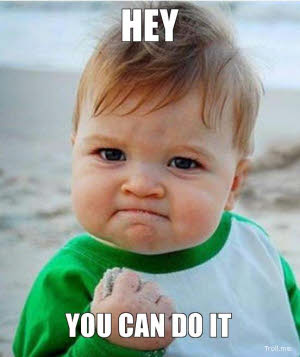2015 was pretty great, but there was one thing I did really terribly throughout the year – manage my time.
The benefits of having a flexible, totally self-directed schedule are obvious. I can wake up whenever I like, work any hours I want to, go to capoeira class in the middle of the day, take naps, etc.
Having time and location flexibility was one of THE main reasons I got into online business. In some ways, though, it’s surprisingly hard to handle. Here are three reasons why:
1) Decision fatigue from constantly choosing exactly how much (or how little) to bend your routine
Let’s say I spend several hours training capoeira mid-day; the trade-off is that I need to get work done in the evening. If someone then invites me to hang out or do something in the evening, I’d have to say “I can’t – I have to work.”
But technically I could go, I’m just choosing not to because if I made a habit of giving up work time for social invitations, then nothing would get done. However, if there’s a compelling enough factor (like an event I really want to attend, or a friend leaving town who I won’t see again for a while), then I could make a special exception.
This leads to me weighing up every single invitation and opportunity, trying to decide whether I should or shouldn’t sacrifice working hours or change my plans around. It’s a complex equation that factors in how much work I have versus how much or how little I want to go out, as well as how long the other activity is likely to last (coffee with an American friend = 1 hour max. Brazilian BBQ = there’s no way you’re leaving before at least 4 hours have gone by).
That’s not where I want to spend my decision-making energy. Also, because I’ve been under deadline the entire year due to a 12-month program I was running, my default answer is usually to decline invitations and stay home working instead. But that results in an imbalance tilting towards too much work and too little social life.

Decision fatigue: it’s a real phenomenon (image source)
You might be thinking, “Just come up with a schedule for yourself and plan your going out around it!”
Well…
2) Energy and inspiration don’t always match up with scheduled blocks of work time
There have been times when I have the entire next day’s morning reserved for work – but then for whatever reason I don’t sleep well at all during the night, tossing and turning until 3 AM… and then I really need to sleep in, otherwise I’d be a zombie and useless at work anyway.
Other times, I’ve got a nice long chunk of time to work in the afternoon… but the inspiration is just NOT coming and it’s a real battle to concentrate. I spend two hours on a task that should take a third of that time, feeling like I’m slogging through molasses with every step. Then I get anxious because it’s getting late and I didn’t get nearly as much done as I’d hoped (or needed) – which of course makes it even harder to focus.
When I’m doing creative work and it’s just not “flowing,” it’s often counterproductive to keep pushing it. Better to switch to something else or even step away from work entirely for a while. This is why scheduling my tasks and work periods doesn’t always work.

Where’s my flow??? (image source)
3) Very blurred lines between working and non-working time
Since I don’t have specific start and end times for my workday (and work week), I sort of end up being “always on.” I flit between my personal inbox and my work inbox way too much… I check Facebook while a video file I’ve been working on is rendering and uploading… I’ll be doing something non-work-related but an idea for the business will pop into my head and I’ll rush to the computer to document and/or research it, etc.
The result is constant guilt. When I’m out enjoying life, I feel like I “should” be working, because things have been left undone. When I’m plugging away at the work, I feel like I “should” be out and about more, because what’s the point of having an online business if you can’t enjoy the perks of more free time?
Another thing contributing to the confusion/guilt is the fact that for the first 3 years of the business, I worked extremely hard. I really hustled, pushed myself, and was mind-blowingly productive. The 4th year (this past year) has been the first one in which I’ve been able to take a bit of a step back and NOT rush forward at such a frantic pace.
However, the habit of having that drive (and the expectations of results) doesn’t disappear overnight. It’s as if I still expect myself to produce at that urgent, under-pressure pace – constantly. Not to mention that when I take a breather to evaluate my business strategically, of course I come up with a ton of stuff I want to implement and improve… and feel the urge to plunge in and get it all done NOW.

Been carrying this around allllll year (image source)
So yes – these three factors are why it’s been such a struggle to manage my time this year. Obviously I don’t want the pattern to continue, so here’s what I’m going to try doing differently in 2016:
1) Have reasonable, clearly-defined goals for each day
When I’m not sure what exactly to work on, I do a bit of everything and then feel like I didn’t accomplish much. From now on, I’ll have 1-3 MITs (Most Important Tasks) daily – and once those are done, I’m done for the day, guilt-free.

The work is never-ending… so I need to set a daily end point, and stick to it. (Image source)
2) Having a “ritual” for starting and finishing work
By “ritual” I mean a simple set of steps that I always follow, in order to train my brain to get into (and out of) work mode. Like a pro athlete running through the exact same set of motions before a competition.
I’m thinking…
- Starting:
- Turn on Cold Turkey (a program that blocks distracting sites)
- Start listening to Brain.fm in earbuds
- Begin with e-mail (I know most advice says NOT to, but for me clearing the inbox is a low-friction task that’s a quick win and helps me get in the work mindset)
- Get to work on Most Important Tasks
- Finishing:
- Record what was accomplished in my timesheet
- Write down tomorrow’s Most Important Tasks and e-mail them to myself to arrive tomorrow morning (using followupthen.com)
- Close all work-related files and folders, then physically get up and do something away from the computer
The timesheet thing has an additional benefit – I’ll get a record of exactly what I’m working on and how long each task takes. This should show me if I need to reallocate my time, as well as help me make future hiring decisions.

Having to punch the clock feels different when it’s self-imposed.
3) Take intentional time off
I can’t remember the last time I took a real break.
The rare days when I’m totally offline due to travel or internet outages, I’m anxious to get back to my inbox just in case one of my customers needs help. Plus, since work is generally more of a pleasure than a chore, I tend to want to do some work every day (especially when I’ve got an exciting new idea or project to sink my teeth into).
But I believe that time completely off from work has the power to refresh and renew one’s energy and creativity. I’m not sure yet how I’m going to structure this – maybe take one day off a week, one week off per quarter… in any case, I think I’ll have to purposefully give myself something else to do instead (a trip, a hobby, a good book to read) because otherwise I’ll just naturally drift back to work.

If I do this, I will end up thinking about business. (Image source)
Here’s to better work habits in 2016!

